INDUSTRIAL POLLUTANTS
Industrial waste is waste resulting from industry
or productive labor. Chemicals, minerals, and other toxins can
be discharged into local waterways by businesses. These discharges
are regulated and the rules must be carefully followed by regional
businesses to insure the safety of our citizens. Chemicals that
are discarded on business property can also find their way into
our water. Long term leaching and flooding can move these chemicals
into the water.
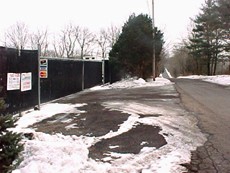 |
|
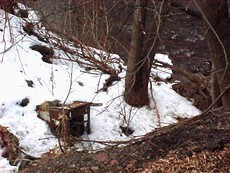 |
| Businesses near local waterways
must be careful about chemicals leaching into the soil. For example, this
salvage garage that is upslope from the East Branch of the Perkiomen Creek
must be very careful of how chemicals and trash are handled. |
|
Here is trash disposed of
next to a local waterway. Area residents should discard all trash in a
safe manner so that it does not effect water quality. |
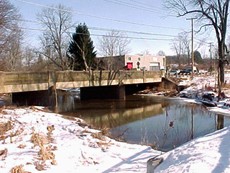 |
|
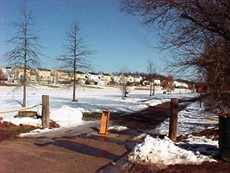 |
| Many local businesses are located next to the East
Branch of the Perkiomen Creek. This business on Callowhill Street is one
of many in Perkasie and Sellersville that are located in the floodplain
for the creek. |
|
These homes on the other side of Callowhill Street
are very close to the floodplain. Any chemical improperly disposed of
from these households can easily leach in to the local waterway. |
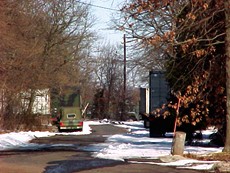 |
|
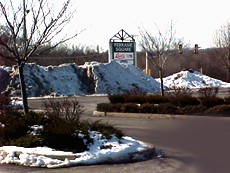 |
| The garage of the National Guard armory
in Sellersville is in the floodplain of the East Branch of the Perkiomen
Creek. |
|
Piles of salty road snow eventually end
up in our waterways. |
CORROSIVE SUBSTANCES
In sewer lines, compounds like cleaners, solvents,
thinners, pesticides, and laboratory chemicals may cause toxic
gases and fumes. The toxins can leach into local waterways.
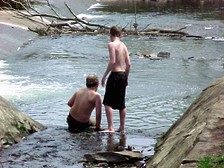 Swimmers in the East Branch of the Perkiomen Creek
at Walnut Street bridge in Perkasie. Swimmers in the East Branch of the Perkiomen Creek
at Walnut Street bridge in Perkasie. |
Both businesses
and individuals must be careful not to discard chemicals in their
sewer system (toilet, sink, etc). What you pour down the drain
may end up in local streams or your drinking water at a later
time. Be very careful about what goes into your water! |
WASTEWATER
Temperature Pollution
| High temperatures can
cause materials in the wastewater to release gases in some sewers
or can disrupt operations in sewage treatment plants. Industrial
wastewater must not exceed 65º C (150º F), at the point
where it enters the public sewer system. |
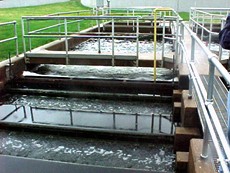 |
Biosolids
Biosolids are nutrient organic solids produced
by wastewater treatment processes. The goal is to produce the
most contaminant-free biosolids practically achievable. Biosolids
effect the environment in a variety of ways. For example, before
they were are applied to an area, a tree only grew a little in
twenty years. After the biosolids were applied it grew twice as
much in only nine years. Flooding of sewage treatment plants can
cause biosolids to contaminate local waterways.




